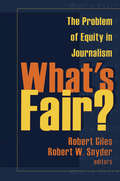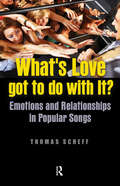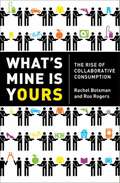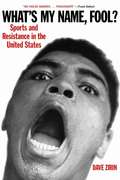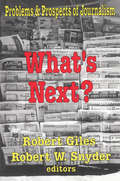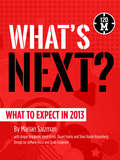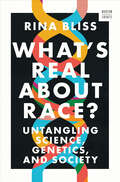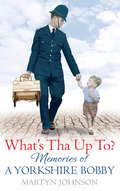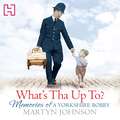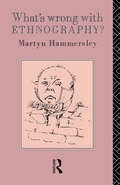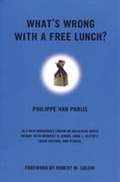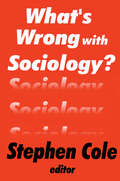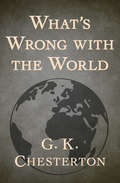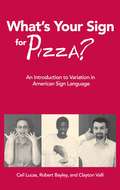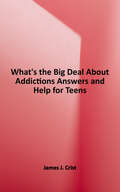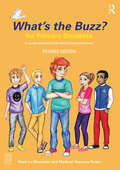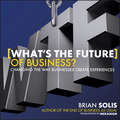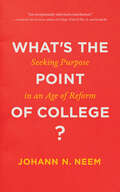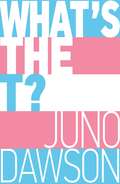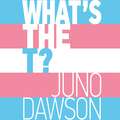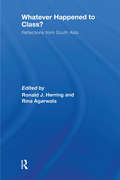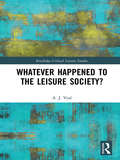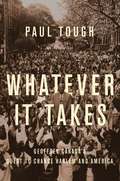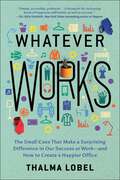- Table View
- List View
What's Fair?: The Problem of Equity in Journalism
by Geoff DenchWhat's fair? It is an old question in journalism. In 1999, it seems more difficult to answer than ever. The cycle of story, spin, and counterspin that surrounds the White House is only the most obvious part of the problem. In the past 25 years, the practice of journalism has changed enormously--particularly in the United States. The demarcation of public and private life that once ruled certain kinds of stories out-of-bounds has eroded, leaving reporters with the unenviable challenge of having to cover events whose seaminess inevitably taints all who touch them. Commercial pressures, and a tidal wave of information and entertainment media, have engulfed the news business--leaving the definitions of journalism and journalistic standards vague and uncertain. And the technology of news reporting is speeding up news cycles in ways that leave little time for sober and measured judgments.What's Fair? is a collection of essays from experts in the field that are sure to spark compelling questions and ideas about journalism and its place in our time. In "Fairness--A Struggle," journalists explore a subject that they normally share only with close friends and colleagues--their own struggles with fairness that occurred in places as different as South Africa, Washington, and the South Bronx. In "Fairness--A History," nine contributors examine the history of the fairness question, specifically the establishment of the Hutchins Commission report of 1947, which is evaluated here by a historian, a journalist and a First Amendment authority. In a comparative vein, two authorities on international communications law examine British regulations for fairness in broadcasting at the end of the 20th century. In "Fairness--A Goal," contributors explore what struggles for fairness mean in a variety of contexts, from American newsrooms to post-Communist Poland to Northern Ireland.Many discussions of fairness are either numbingly abstract or impossibly righteous. To avoid those hazards, Robert Giles and Robert Snyder have grounded this volume in stories--the kind of stories journalists tell each other and the kind of stories people tell about journalism. This volume is a testament to journalism that is free yet fair, probing yet credible and authoritative in content yet open to many voices.Robert Giles is editor-in-chief of Media Studies Journal, senior vice president of the Freedom Forum and executive director of Media Studies Center. Formerly the editor and publisher of The Detroit News, he is the author of Newsroom Management: A Guide to Theory and Practice.Robert W. Snyder is editor of the Media Studies Journal, a historian, and most recently author of Transit Talk: New York's Bus and Subway Workers Tell Their Stories. He has taught at Princeton University and New York University, from which he holds a doctorate in history.
What's Love Got to Do with It?: Emotions and Relationships in Pop Songs
by Thomas J. ScheffWhat do pop songs have to say about love? Surprisingly, this book shows that most popular love songs express much more about alienation, infatuation, estrangement, jealousy, and heartbreak than about love. Scheff takes the reader on a tour of popular lyrics from 80 years of American song to reveal the emotional and relational meaning of lyrics. He shows that popular love songs typically steer listeners away from a healthy connection to the emotions surrounding love. Readers will gain a deeper understanding of love songs while appreciating the author's suggestions for how listeners and artists could enrich the art of the love song.
What's Mine Is Yours: The Rise of Collaborative Consumption
by Roo Rogers Rachel Botsman“Amidst a thousand tirades against the excesses and waste of consumer society, [this book] offers us something genuinely new and invigorating: a way out.” —Steven Johnson, New York Times–bestselling author of The Infernal MachineA groundbreaking and original book, What’s Mine is Yours articulates for the first time the roots of “collaborative consumption,” the authors’ term for the technology-based peer communities that are transforming the traditional landscape of business, consumerism, and the way we live. Those who seek an alternative to voracious shopping and the mindless accumulation of possessions will be inspired by this landmark contribution to the evolving ecology of commerce and sustainability.“Driven by growing dissatisfaction with their role as robotic consumers manipulated by marketing, people are turning more and more to models of consumption that emphasize usefulness over ownership, community over selfishness, and sustainability over novelty . . . Part cultural critique and part practical guide to the fledgling collaborative consumption market, the book provides a wealth of information for consumers looking to redefine their relationships with both the things they use and the communities they live in.” —Publishers Weekly
What's My Name, Fool?
by Dave Zirin"Zirin is America's best sportswriter."--Lee Ballinger, Rock and Rap Confidential"Zirin is one of the brightest, most audacious voices I can remember on the sportswriting scene, and my memory goes back to the 1920s."--Lester Rodney, N.Y. Daily Worker sports editor, 1936-1958"Zirin has an amazing talent for covering the sports and politics beat. Ranging like a great shortstop, he scoops up everything! He profiles the courageous and inspiring athletes who are standing up for peace and civil liberties in this repressive age. A must read!"--Matthew Rothschild, The Progressive"This is cutting-edge analysis delivered with wit and compassion."--Mike Marqusee, author, Redemption Song: Muhammad Ali and the Spirit of the SixtiesHere Edgeofsports.com sportswriter Dave Zirin shows how sports express the worst, as well as the most creative and exciting, features of American society.Zirin explores how Janet Jackson's Super Bowl flash-time show exposed more than a breast, why the labor movement has everything to learn from sports unions and why a new generation of athletes is no longer content to "play one game at a time" and is starting to get political.What's My Name, Fool! draws on original interviews with former heavyweight champ George Foreman, Olympian and black power saluter John Carlos, NBA basketball player and anti-death penalty activist Etan Thomas, antiwar women's college hoopster Toni Smith, Olympic Project for Human Rights leader Lee Evans and many others.Popular sportswriter and commentator Dave Zirin is editor of The Prince George's Post (Maryland) and writes the weekly column "Edge of Sports" (edgeofsports.com). He is a senior writer at basketball.com. Zirin's writing has also appeared in The Source, Common Dreams, College Sporting News, CounterPunch, Alternet, International Socialist Review, Black Sports Network, War Times, San Francisco Bay View and Z Magazine.
What's Next?: The Problems and Prospects of Journalism
by Robert Giles Robert W. SnyderThe future of journalism isn't what it used to be. As recently as the mid-1960s, few would have predicted the shocks and transformations that have swept through the news business in the last three decades: the deaths of many afternoon newspapers, the emergence of television as people's primary news source and the quicksilver combinations of cable television, VCRs and the Internet that have changed our ways of reading, seeing, and listening.The essays in this volume seek to illuminate the future prospects of journalism. Mindful that grandiose predictions of the world of tomorrow tend to be the fantasies and phobias of the present written large-in the 1930s and 1940s magazines such as Scribner's, Barron's, and Collier's forecast that one day we would have an airplane in every garage-the authors of What's Next? have taken a more careful view.The writers start with what they know-the trends that they see in journalism today-and ask where will they take us in the foreseeable future. For some media, such as newspapers, the visible horizon is decades away. For others, particularly anything involving the Internet, responsible forecasts can look ahead only for a matter of years. Where the likely destinations of present trends are not entirely clear, the authors have tried to pose the kinds of questions that they believe people will have to address in years to come.While being mindful of the tremendous influence of technology, one must remember that computers, punditry, or market share will not ordain the future of journalism. Rather, it will be determined by the sum of countless actions taken by journalists and other media professionals. These essays, with their hopes and fears, cautions and enthusiasms, questions and answers, are an effort to create the best possible future for journalism. This volume will be of interest to media professionals, academics and others with an interest in the future of journalism.
What's Next?: What to Expect in 2013
by Marian SalzmanThe "new" has never been more crucial, as the entire world, from emerging to mature economies, is now creating new products, services and experiences at an unprecedented rate. Whether you are helming an organization or developing your personal brand, your survival depends on finding new opportunities. Staying ahead of these changes and developing the ability to communicate them to a broader group will empower you to become a vanguard competitor within your industry and within the world at large. In What's Next?, Havas PR CEO Marian Salzman reveals her predictions for tomorrow's trends. This dynamic trendopedia--aggregated from Salzman's public and private forecasts--highlights what you need to know about how and where we will live, love, communicate, relate, work, relax, invest, learn, travel and prosper in 2013, and how to track these trends in order to generate opportunity, anticipate risk and enjoy a savvier journey into tomorrow. In addition to more than 150 predictions in 30 categories, Salzman has identified 2013 as the year when "Co" makes its presence felt in all aspects of our lives. Salzman, author of 15 books and named one of the world's top five trendspotters by The Independent and Nielsen, employs a methodology--pattern recognition--that has launched or popularized a wide range of trends, from singletons and metrosexuality to food fear and globesity. Salzman and her contributors at Havas are constantly spotting changes and evolutions in the global marketplace. What's Next? is the first release from 120M Books, the publishing arm of Havas PR, committed to independent and futuristic publication of brainfood for the thinking public. "120M" is code for "120 minutes' worth," our recipe for the smart reading meal. If trends fuel the ways we see our future (they do), think of What's Next? as your road map for recognizing the next normal and learning how to tell that story.
What's Real about Race?: Untangling Science, Genetics, and Society (A Norton Short)
by Rina BlissA paradigm-shifting tour of genetics and identity arguing that race is at once a biological fiction and a social reality. Biologically, race does not exist. Scientists have proven that human DNA is 99.9 percent identical. But we know that racism and its structural impacts shape our health, opportunities, and lives in profound ways. What is the true relationship between genetics and race? And how should we talk about identity in science and medicine? In What’s Real About Race?, sociologist Rina Bliss illuminates the truth about one of the most misunderstood, controversial concepts in our society and reveals why we cannot confuse race with genetic difference. Blending energizing prose with the latest in genetics research, this paradigm-shifting tour unmasks what’s truly real about race: namely, racism’s impact on our bodies and lives. Bliss traces the history of race, revealing how unscientific categories of identity—White, Black, Asian/Pacific Islander, and American Indian/Alaska Native—became the modern standard, and illuminates how the myth of biological races endures in science and society, warping our understanding of complex topics like intelligence, disease susceptibility, and behavior. Along the way, What’s Real About Race? busts enduring myths about IQ, ancestry tests, behavioral racism, and more. In fascinating explorations of gene research, medicine, and social justice, Bliss argues for a new way forward. To create equity in science and society, we must disentangle our understanding of genetics from identity and see race for what it really is: a purely social category At a time when misinformation about our bodies and identities is dangerously prevalent, What’s Real About Race? is an indispensable resource and a powerful reminder that, biologically, our similarities vastly outweigh our differences.
What's Tha Up To?: Memories of a Yorkshire Bobby
by Martyn Johnson'A wonderful slice-of-life autobiography' Daily Express'I've turned boys into men and policemen into coppers,' said the Sergeant. 'Policemen have got brains, but coppers, they've got brains and common sense.'No two days were ever the same for bobby-on-the-beat Martyn Johnson. Come rain or come shine, he patrolled his patch with a sharp eye for troublemakers and a kind word for those in need of a friend. Whether he was pursuing unlikely coal thieves, tracking down peacocks gone AWOL or investigating mysterious flying saucers over Sheffield, PC Johnson faced every new challenge with a smile and a healthy dose of his copper's common sense. In his charming and funny memoir, Martyn Johnson recalls the rogues, cheats and scoundrels - as well as the many friends - who made his life on the beat so unforgettable.
What's Tha Up To?: Memories of a Yorkshire Bobby
by Martyn Johnson'I've turned boys into men and policemen into coppers,' said the Sergeant. 'Policemen have got brains, but coppers, they've got brains and common sense.'No two days were ever the same for bobby-on-the-beat Martyn Johnson. Come rain or come shine, he patrolled his patch with a sharp eye for troublemakers and a kind word for those in need of a friend. Whether he was pursuing unlikely coal thieves, tracking down peacocks gone AWOL or investigating mysterious flying saucers over Sheffield, PC Johnson faced every new challenge with a smile and a healthy dose of his copper's common sense. In his charming and funny memoir, Martyn Johnson recalls the rogues, cheats and scoundrels - as well as the many friends - who made his life on the beat so unforgettable.
What's Wrong With Ethnography?: What's Wrong With Ethnography? (1992) (Routledge Revivals Ser.)
by Martyn HammersleyThis stimulating and refreshing study, written by one of the leading commentators in the field, provides novel answers to these crucial questions. "What's Wrong With Ethnography provides a fresh look at the rationale for and distinctiveness of ethnographic research in sociology, education and related fields, and succeeds in slaying a number of currently fashionable sacred cows. Relativism, critical theory, the uniqueness of the case study and the distinction between qualitative and quantitative research are all examined and found wanting as a basis for informed ethnography. The policy and political implications of ethnography are a particular focus of attention. The author compels the reader to reexamine some basic methodological assumptions in an exciting way", Martin Bulmer, London School of Economics.
What's Wrong With a Free Lunch? (New Democracy Forum #9)
by Philippe ParijsOur politicians insist that we live in a time of unprecedented prosperity, yet more and more Americans are pointing out that the richest 1% of our society holds more wealth than the bottom 90% put together. In this timely book, economist Philippe Van Parijs has a simple plan for addressing not only poverty but other social ills: everyone would be paid a universal basic income (UBI) at a level sufficient for subsistence. Everyone, including "those who make no social contribution-who spend their mornings bickering with their partner, surf off Malibu in the afternoon, and smoke pot all night." <P><P>Van Parijs argues that a UBI would reduce unemployment, improve women's lives, and prevent the environmental damage caused by overproduction and fast growth. At the heart of his proposal is the intention to secure real freedom for all, because it offers the greatest possible opportunity to those with the least opportunities. He acknowledges that an idle surfer might not deserve a UBI, but that the surfer's good luck would be no different than the good fortune enjoyed by those who benefit from the current distribution of resources. <P><P>Responses to this controversial proposal vary: Some are in favor of a basic income, but only if it's tied to work. Others find the entire proposal unrealistic and unaffordable. Almost all agree, however, that it is time for us to talk about this issue. <P><P>NEW DEMOCRACY FORUM: A series of short paperback originals exploring creative solutions to our most urgent national concerns. The series editors (for Boston Review), Joshua Cohen and Joel Rogers, aim to foster politically engaged, intellectually honest, and morally serious debate about fundamental issues-both on and off the agenda of conventional politics.
What's Wrong with Sociology?
by Stephen ColeSince the 1950s sociology has experienced a decline in prestige when compared with the other social sciences. In some highly publicized cases some universities have retrenched their sociology departments, others are contemplating either retrenchment or downsizing of their departments. Although there are some practitioners of the discipline who believe that it has never been in better shape, many sociologists have come to believe that there are very serious problems both in the cognitive and social organization of the discipline. This book contains sixteen essays by sociologists who believe that their discipline faces very serious problems which must be overcome if the discipline is to survive and prosper. The contributors were selected to represent diverse views and thus there is substantial disagreement among them over what the problems are that sociology faces and how they may be remedied. In this highly provocative book readers is likely to find some essays they agree with and others they disagree with; but all the essays present important problems faced by the discipline which must be addressed.Although the authors of the sixteen essays do not agree on what is wrong with the discipline, there are some themes which appear frequently. In his introduction Cole summarizes and comments on these themes. His introduction centers on the question of whether sociology is entirely socially constructed. Is what we believe to be true about society constrained by empirical evidence or is it a result of our ideology, power, authority, and other social processes? One theme which appears in many of the essays is that sociology has become too ideological and as a result has lost credibility among university administrators, politicians and the general public. Many of the essays also stress the view that there are very low levels of consensus in sociology and that it is hard to see evidence of progress. Others criticize the discipline for not dealing with the really important social issues and see much of the work published as being parochial and trivial. Questions are also raised about why the use of causal models has failed to generate solutions to most of the problems the discipline addresses. Some authors believe that the discipline adheres to an overly rational model of human behavior and has failed to keep up with some of the advances introduced by post-modernist theories.This highly readable set of essays should be of interest to all those are concerned about the current state of sociology. They will also be useful in introducing graduate students to some of the most important issues currently being debated in the field.Stephen Cole is currently professor of sociology at the State University of New York at Stony Brook and professor of sociology at the University of Queensland, Australia. He is the author of Making Science: Between Nature and Society, and with Jonathan R. Cole, Social Stratification in Science.
What's Wrong with the World
by G. K. ChestertonAn enduring collection of moral and social commentary from one of the twentieth century's most original thinkers This groundbreaking work epitomizes why G. K. Chesterton is considered one of the pithiest and most versatile philosophers of his era. An anthology of his early writings, What's Wrong with the World takes on such thorny subjects as public education, jingoism, feminism, imperialism, politics, and the modern family. Chesterton's humor and intellectual verve are on full display, making these incisive essays as applicable in their exploration of ethics and the human heart today as when they were penned over a hundred years ago. This ebook has been professionally proofread to ensure accuracy and readability on all devices.
What's Your Sign for Pizza?: An Introduction to Variation in American Sign Language
by Ceil Lucas Robert Bayley Clayton ValliThis introductory text celebrates another dimension of diversity in the United States Deaf community — variation in the way American Sign Language (ASL) is used by Deaf people all across the nation. The different ways people have of saying or signing the same thing defines variation in language. In spoken English, some people say “soda,” others say “pop,” “Coke,” or “soft drink;” in ASL, there are many signs for “birthday,” “Halloween,” “early,” and of course, “pizza.” What’s Your Sign for Pizza? derives from an extensive seven-year research project in which more than 200 Deaf ASL users representing different ages, genders, and ethnic groups from seven different regions were filmed sharing their signs for everyday vocabulary. The film clips form a supplemental resource to the text and are referenced in their relevant chapters. The text begins with an explanation of the basic concepts of language and the structure of sign language. Each part of the text concludes with questions for discussion, and the final section offers three supplemental readings that provide further information on variation in both spoken and signed languages. What’s Your Sign for Pizza also briefly sketches the development of ASL, which explains the relationships between language varieties throughout the country. The videos are available online at www.youtube.com/GallaudetUniversityPress.
What's the Big Deal About Addictions?: Answers and Help for Teens
by James J. CristFrom drugs and alcohol to pervasive use of electronic devices, more teens are exhibiting addictive behaviors. What’s the Big Deal About Addictions? provides teens with lecture-free, reliable, and factual information about a range of addictions, from drugs and alcohol to electronic devices, social media, and other addictive activities, such as pornography, eating, gambling, and sex, among others. <p><p>A practicing psychologist and a certified substance abuse counselor, Dr. Crist shares advice for teens who are having serious troubles with addiction and for teens with casual levels of use who may be concerned about their use. With teen stories and quotes included, What’s the Big Deal About Addictions? speaks directly to teens about the real-life struggles with casual use and addictions they’re seeing and experiencing among peers in school and in the broader community.
What's the Buzz? for Primary Students: A Social and Emotional Enrichment Programme
by Mark Le Messurier Madhavi Nawana ParkerWhat’s the Buzz? is an internationally renowned series of programmes designed to help children and young people develop social and emotional awareness. Now available in a revised second edition, What’s the Buzz for Primary Students is a sixteen-lesson programme targeting everyday social challenges faced by primary aged children, such as peer pressure and bullying style behaviours; competition and handling disappointment; feelings and wellbeing and self-awareness. Each lesson is designed around the SAFE criteria (Sequenced; Active; Focused; Explicit) and includes: A new and beautifully illustrated ‘Archie’ story, in which the popular character faces a new and relatable social challenge A series of lively and exciting games and activity suggestions Role-plays and discussion points so that children can put their skills into practice in a supportive environment Having already proven to appeal to teachers and support staff, counsellors and psychologists worldwide, this resource is suitable for anybody looking to enrich the social lives of children. Resources and training modules to support this book can be found on the website www.whatsthebuzz.net.au.
What's the Future of Business
by Brian Solis"In today's rapidly changing digital environment, Darwinism is alive and well. What's the Future of Business doesn't just explore trends and theories; it introduces a dynamic, actionable path to transformation."--Evan Greene, CMO, The Recording Academy, Producers of the GRAMMY AwardsRethink your business model to incorporate the power of "user" experiences What's the Future of Business? will galvanize a new movement that aligns the tenets of user experience with the vision of innovative leadership to improve business performance, engagement, and relationships for a new generation of consumerism. It provides an overview of real-world experiences versus "user" experiences in relation to products, services, mobile, social media, and commerce, among others. This book explains why experience is everything and how the future of business will come down to shared experiences. Aligns the tenets of user experience with the concepts of innovative leadership to improve business performance and engagement and to motivate readers to rethink business models and customer and employee relationshipsMotivates readers to rethink business models, products and services, marketing, and customer and employee relationships with desired experiences in mindBrian Solis is globally recognized as one of the most prominent thought leaders and published authors in new media, and is the author of Engage! and The End of Business as Usual! Discover how user experience design affects your business, and how you can harness its power for meaningful revenue growth
What's the Point of College?: Seeking Purpose in an Age of Reform
by Johann N. NeemBefore we can improve college education, we need to know what it's for.In our current age of reform, there are countless ideas about how to "fix" higher education. But before we can reconceptualize the college experience, we need to remember why we have these institutions in the first place—and what we want from them. In What's the Point of College?, historian Johann N. Neem offers a new way to think about the major questions facing higher education today, from online education to disruptive innovation to how students really learn. As commentators, reformers, and policymakers call for dramatic change and new educational models, this collection of lucid essays asks us to pause and take stock. What is a college education supposed to be? What kinds of institutions and practices will best help us get there? And which virtues must colleges and universities cultivate to sustain their desired ends? During this time of drift, Neem argues, we need to moor our colleges once again to their core purposes. By evaluating reformers' goals in relation to the specific goods that a college should offer to students and society, What's the Point of College? connects public policy to deeper ethical questions. Exploring how we can ensure that America's colleges remain places for intellectual inquiry and reflection, Neem does not just provide answers to the big questions surrounding higher education—he offers readers a guide for how to think about them.
What's the T?: The no-nonsense guide to all things trans and/or non-binary for teens
by Juno DawsonDiscover what it means to be a young transgender and/or non-binary person in the twenty-first century in this frank and funny guide for 14+ teens, from the author of This Book is Gay. In What's the T?, Stonewall ambassador, bestselling trans author and former PSHE teacher Juno Dawson defines a myriad of labels and identities and offers uncensored advice on coming out, sex and relationships with her trademark humour and lightness of touch. Juno has also invited her trans and/or non-binary friends to make contributions, ensuring this inclusive book reflects as many experiences as possible, and features the likes of Travis Alabanza and Jay Hulme. The companion title to the This Book Is Gay, What's the T? tackles the complex realities of growing up trans with honesty and humour, and is joyfully illustrated by gender non-conforming artist Soofiya.
What's the T?: The no-nonsense guide to all things trans and/or non-binary for teens
by Juno DawsonDiscover what it means to be a young transgender or non-binary person in the twenty-first century in this frank and funny guide for 14+ teens, from the author of This Book is Gay. In What's the T?, Stonewall ambassador, bestselling trans author and former PSHE teacher Juno Dawson defines a myriad of labels and identities and offers uncensored advice on coming out, sex and relationships with her trademark humour and lightness of touch. Juno has also invited her trans and non-binary friends to make contributions, ensuring this inclusive book reflects as many experiences as possible, and features the likes of Travis Alabanza and Jay Hulme. The companion title to the groundbreaking This Book Is Gay, What's the T? tackles the complex realities of growing up trans with honesty and humour, and is joyfully illustrated by gender non-conforming artist Soofiya.(P)2020 Hodder & Stoughton Limited
Whatever Happened to Class?: Reflections from South Asia
by Rina Agarwala Ronald J. HerringClass explains much in the differentiation of life chances and political dynamics in South Asia; scholarship from the region contributed much to class analysis. Yet class has lost its previous centrality as a way of understanding the world and how it changes. This outcome is puzzling; new configurations of global economic forces and policy have widened gaps between classes and across sectors and regions, altered people’s relations to production, and produced new state-citizen relations. Does market triumphalism or increased salience of identity politics render class irrelevant? Has rapid growth in aggregate wealth obviated long-standing questions of inequality and poverty? Explanations for what happened to class vary, from intellectual fads to global transformations of interests. The authors ask what is lost in the move away from class, and what South Asian experiences tell us about the limits of class analysis. Empirical chapters examine formal and informal-sector labor, social movements against genetic engineering, and politics of the "new middle class." A unifying analytical concern is specifying conditions under which interests of those disadvantaged by class systems are immobilized, diffused, coopted -- or autonomously recognized and acted upon politically: the problematic transition of classes in themselves to classes for themselves.
Whatever Happened to the Leisure Society? (Routledge Critical Leisure Studies)
by A. J. VealThe idea of a ‘leisure society’ was in its heyday in the 1960s and 1970s, when it was predicted that the pattern of falling working hours which had been experienced in Western societies in the first half of the twentieth century would continue indefinitely. The leisure society has clearly not been realised. On the contrary: contemporary industrial societies seem to be characterised by a shortage of time, experienced as ‘time squeeze’ and stress. The leisure society idea can be seen as the modern version of the age-old dream of a ‘life of ease and plenty’. This analytically and empirically rich book traces the idea in history, through biblical, classical Greek, medieval and nineteenth century utopian writings and into twentieth century concerns with dystopia and the impact of rapid technological change. The ‘leisure society’ concept turns out to have been an elusive and short-lived phenomenon. For a variety of reasons, the trend towards shorter working hours ran out of steam in the last quarter of the twentieth century. However, while leisure scholars have deserted the topic, a diverse range of activists, including environmentalists, economists and feminists, continue to make the case for reducing working hours. Whatever Happened to the Leisure Society? concludes that the on-going ‘struggle for time’ should be supported, for the sake of human health and well-being and for the sake of the planet. This is a valuable resource for students and academics in the fields of leisure studies, cultural studies, history, economics, sociology and political science.
Whatever It Takes: Geoffrey Canada's Quest to Change Harlem and America
by Paul Tough<P>What would it take? <P>That was the question that Geoffrey Canada found himself asking. What would it take to change the lives of poor children - not one by one, through heroic interventions and occasional miracles, but in big numbers, and in a way that could be replicated nationwide? The question led him to create the Harlem Children's Zone, a ninety-seven-block laboratory in central Harlem where he is testing new and sometimes controversial ideas about poverty in America. His conclusion: if you want poor kids to be able to compete with their middle-class peers, you need to change everything in their lives - their schools, their neighborhoods, even the child-rearing practices of their parents. <P>Whatever It Takes is a tour de force of reporting, an inspired portrait not only of Geoffrey Canada but also of the parents and children in Harlem who are struggling to better their lives, often against great odds. Carefully researched and affecting, this is the most daring and potential social experiment of our time.
Whatever Works: The Small Cues That Make a Surprising Difference in Our Success at Work--and How to Create a Happier Office
by Thalma LobelAn internationally renowned psychologist shows us how overlooked factors in our work days-our physical environments, our unconscious habits, and even traits like our faces and voices-have the power to make or break our careers. In Whatever Works: The Small Cues That Make a Surprising Difference in our Success at Work—and How to Create a Happier Office, Thalma Lobel, one of the world's leading experts on human behavior, explores groundbreaking psychological research on job performance, satisfaction, and creativity. Lobel goes beyond obvious considerations like salary, title, and company culture to shed light on the hidden factors-often unrecognized, counterintuitive, or invisible-that have profound effects on how well we can do our jobs and how happy we are at work. Did you know that just doodling in a certain way can increase your creativity? That looking at something green for forty seconds will improve your attention? That crossing your legs similarly to an interviewer could get you the job? That the mere presence of a smartphone on your desk can lessen your performance, even if it's turned off? That being in a warmer room makes you more likely to want to conform with the group, affecting your decision-making? These are the invisible factors that nudge our behavior on a daily basis, and combined, have a real and significant bearing on our success-or failure-at work. In today's competitive market, where even tiny differences can be decisive, for both employees and organizations, exploiting such factors can make all the difference. The more you know about the subtle elements that can help or hinder you on the job, the better equipped you can be to take control and navigate today's competitive work world. Helpful for anyone from individual employees to managers to leaders of large organizations, Whatever Works shares valuable insights and practical takeaways to transform your professional life.
